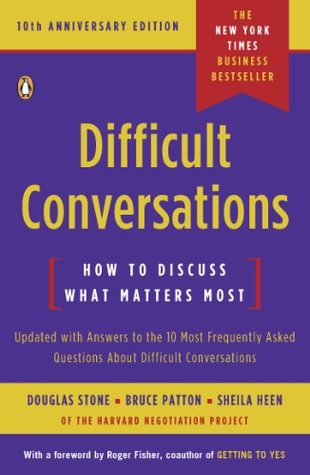More on this book
Community
Kindle Notes & Highlights
Started reading
August 14, 2019
No matter how good you get, difficult conversations will always challenge you. The authors know this from experiences in our own lives. We know what it feels like to be deeply afraid of hurting someone or of getting hurt. We know what it means to be consumed by guilt for how our actions have affected others, or for how we have let ourselves down. We know that even with the best of intentions, human relationships can corrode or become tangled, and, if we are honest, we also know that we don’t always have the best of intentions. We know just how fragile are the heart and the soul. So it is best
...more
1. The “What Happened?” Conversation. Most difficult conversations involve disagreement about what has happened or what should happen. Who said what and who did what? Who’s right, who meant what, and who’s to blame? Jack and Michael tussle over these issues, both out loud and internally. Does the chart need to be redone ? Is Michael trying to intimidate Jack? Who should have caught the error? 2. The Feelings Conversation. Every difficult conversation also asks and answers questions about feelings. Are my feelings valid? Appropriate?
Should I acknowledge or deny them, put them on the table or check them at the door? What do I do about the other person’s feelings? What if they are angry or hurt? Jack’s and Michael’s thoughts are littered with feelings. For example, “This is the thanks I get?!” signals hurt and anger, and “I’m under tremendous pressure” reveals anxiety. These feelings are not addressed directly in the conversation, but they leak in anyway. 3. The Identity Conversation. This is the conversation we each have with ourselves about what this situation means to us. We conduct an internal debate over whether this
...more


